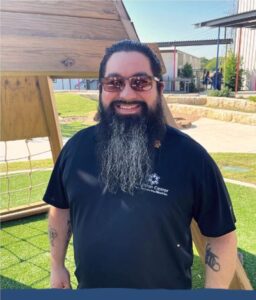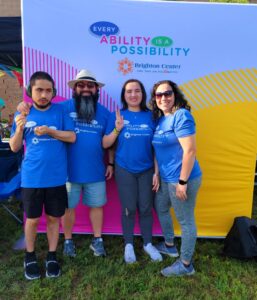Special Education Support Services (SESS)
Brighton Center’s Special Education Support Services (SESS) Program consults with caregivers of children with disabilities to be advocates for their children. Our Special Education Consultants also support young adults with disabilities and delays throughout their entire process.
The following interview comes from a conversation with Brighton Center’s Special Education Support Service (SESS) Program Manager, Juan Hernandez. He has been working at Brighton Center for the last 8 years. He is a soldier, father, advocate, and awesome human being. I hope you enjoy getting to know him.
Interviewer: Alejandro Martinez (Special Education Consultant, Brighton Center)
 AM: Thank you again Juan for your time this morning. First off, give us some details about who you are. Who is Juan Hernandez?
AM: Thank you again Juan for your time this morning. First off, give us some details about who you are. Who is Juan Hernandez?
JH: I think to sum me up right, and for me, I always like to use the good and the bad because it has made me who I am. All those things contribute to who I am as a person. But I think 100% I am a soldier, a warrior. That’s the veteran side of me. It is who I am as a man. It is who I was when I met my wife, and when we had our family. I am also a consultant and advocate for the special needs community, the special needs population as a whole, because there’s just such oversight when it comes to the people that make legislation, the people that design these services, and how long these services last.
There’s just huge oversight, you know, so trying to advocate for the special education population, and as you know, Brighton Center allows me to advocate on a small scale, but I am somebody who tries to also get outside of the organization and use that platform to advocate for those individuals with special needs. I’m somebody who likes to motivate others. I like to help others find their “why,” their reason for doing whatever it is that they’re doing. Help motivate them in their lives or their line of work. The warrior and advocate side of me are just trying to make my little corner of the world a little bit better and encourage others to do the same.
AM: Speaking of little corners of the world, in your journey you found your way here to Brighton Center. When you started, Brighton Center was not a big organization or as big as it is today, especially the Special Education Support Services (SESS) program. So how did you find your way to Brighton Center?
 JH: My wife and I met in the military, and we traveled around small military cities, not big populations. So there are not a lot of services for kiddos with special needs, just very limited in everything. When we got to San Antonio, my wife pushed me because I think I was being a typical dad where you’re trying to find work, trying to finish school, I’m trying to do all these things, trying to build our village. And my wife was trying to find resources to help get our kids ready for the big, bad world. So, she looked up different classes and found some classes from Any Baby Can. These classes were on the Applied Behavior Analysis with autism and behaviors with autism.
JH: My wife and I met in the military, and we traveled around small military cities, not big populations. So there are not a lot of services for kiddos with special needs, just very limited in everything. When we got to San Antonio, my wife pushed me because I think I was being a typical dad where you’re trying to find work, trying to finish school, I’m trying to do all these things, trying to build our village. And my wife was trying to find resources to help get our kids ready for the big, bad world. So, she looked up different classes and found some classes from Any Baby Can. These classes were on the Applied Behavior Analysis with autism and behaviors with autism.
So, in September or October of 2014 we attended those four sessions, and, in those sessions, they said they had two classes that supplement their course that was given by Brighton Center which is right down the road, so we went to those classes and that’s where Lydia, my wife, was like “this is it.” This is exactly what we needed for learning about special education law, the process, and looking through paperwork and evaluations.
The class was fantastic, so my wife talked to the instructor afterward and asked what it takes to be an advocate, and she told her that I was interested. I wasn’t aware since I was helping clean up the pizza boxes and stuff but, you know, the work tied into what I did in instructing in the Army, and obviously the subject matter is very near and dear to our heart with our kiddos, but you know, it was right then and there that the seed was planted, and the program director at the time kept messaging Lydia and was like “hey tell him to send me his resume, tell him to apply for this position” because there was only one advocacy position open at the time.
So long story short, I applied for the position and officially started on January 5th, 2015, and the rest is history.
AM: You mentioned your children and you spoke about the journey that you and your family went through, especially moving through the military and then trying to find different resources. Can you tell us more about your “WHY” and how that informs the work that you do?
 JH: When my wife and I met, we knew at some point we would have a family, and we had expectations of this family, and we had a pretty good plan laid out. Once we had our children, and they were perfect in our eyes, we soon started to hear the words “autism, “and then we saw speech delays, etc.
JH: When my wife and I met, we knew at some point we would have a family, and we had expectations of this family, and we had a pretty good plan laid out. Once we had our children, and they were perfect in our eyes, we soon started to hear the words “autism, “and then we saw speech delays, etc.
It just seemed like things started to pile on, and being a soldier, both of us being soldiers, we just kind of went with it, like OK this is… what it is. What do we need to do, and we just kind of went. We didn’t stop and think of long-term implications. What’s life going to be like, what’s school going to be like? And the more we learned, the more frustrated and sadder we got because it’s just such an… I can’t even find the word sometime to describe how broken the system is. I think that seeing those deficit areas in the system, in school, in education, I think that put a fire under us.
Like, OK, we need to be better and find better special education support services and mentors for our children and for children that come after them. Making sure that we help create a better system because, honestly, you know the saying “the children are our future,?” They really are! They are going to be our community leaders. They’re going to be our service providers. They’re going to be the ones in the community giving us all the services that we need and taking care of us, so we have to take care of them. So just trying to make the world better and more accessible for my children and children like them.
AM: That’s amazing; thank you for sharing. I know you touched upon this in terms of the roadblocks that are in place for kiddos receiving special education support services, but currently, what are some of the biggest challenges facing special education as a whole?
JH: Right now, and this is fresh out of the pandemic, I think retaining good teachers is a big one currently. When you have somebody dependable, they get thrown more and more work, and it gets overwhelming. And without the support or the training, or whatever other logistical support they need, without all of that, they’re being spread thin. We see it because we’re losing all these great teachers and they’re going into other fields. They’re going into real estate or selling insurance or going into advocacy. They’re going into so many different things because the profession of teaching is just not as revered as it used to be, you know? And unfortunately, not to point fingers, but as you get up the chain in education, we’ve seen where the support just isn’t there. So support is a big one.
profession of teaching is just not as revered as it used to be, you know? And unfortunately, not to point fingers, but as you get up the chain in education, we’ve seen where the support just isn’t there. So support is a big one.
Training is another one where we give these educators big, big shoes to fill. Big responsibilities, right? But they’re not aware of how to fulfill them, so then they start cutting corners and figuring out how to do it without having any knowledge of the law or knowledge of why this is done a certain way, so they do it this way and it’s kind of a misstep. Then things occur, and then the teachers get burnt out.
Also, I think there are limitations in cut off for ages for individuals with special needs and the special education support services they are provided in the community, by the state, by schools or whatever. All their services, all their supports start cutting off at certain ages. Children with autism, children with Down syndrome become adults with autism adults with Down syndrome. Adults with special needs, so we need to treat them accordingly and plan those services accordingly.
Then a big one [challenge] of course, because of our work, I think is the lack of parent involvement. Not only that the schools are not involving parents. I don’t think parents are diving in and getting the knowledge they need. And what I mean is really integrating themselves into their child’s educational planning team. That’s with or without special needs. They really need to get more involved.
AM: How can families prepare for those challenges?
JH: I want to start out with the statement that my children aren’t in the best district in San Antonio. I could tell you that we’re not even among the top five districts in San Antonio. Nevertheless, I have no doubt that they’re getting the best education possible for them. Additionally, I’m completely satisfied with their teams because of the things that I’m going to lay out right now. We’ve put in the work. Not just in my job and my professional title as Special Education Support Service (SESS) Program Manager. We put in the actual work, and then we try to practice what we preach with other families.
 1. It Takes A Village
1. It Takes A Village
So, first thing’s first: You can’t do it alone. We have built our village, and trust me, it does take a village.
2. Don’t Operate Outside Your Competancy
Even as professionals, we don’t know everything. We don’t work outside of our competency. If somebody can do something better than me, then I’m going to talk to them. I need to make friends with them so that they can help or coach me up. We have built our village. We’ve surrounded ourselves with individuals that know this demographic and they can help us through it.
3. Do Your Homework
We start doing our homework. We don’t take anything as gospel. I want to read, and I want to research. I want to know that it’s something that you’re following because that’s procedures, that it is law, it’s the statutes or whatever the case may be.
 4. Communication
4. Communication
Communication is huge. It’s the biggest thing, I think, because without communication, just nothing happens. So before we have any type of meeting with our children’s schools, we e-mail them our expectations. Send an agenda before the meeting to administrators, to whoever we’re going to meet with. I think communication is huge in any relationship, so effective communication is key. When we have concerns with the school, we don’t just e-mail 20 pages of concerns and a big old novel. We make it short, sweet, concise, and very specific. We’re intentional with our words. We bullet point and maybe a sentence per bullet point if even that. It could just be topics of discussion because all the dialogue is going to be in those meetings themselves. I don’t want to overload them.
I think building your village, getting your knowledge up, doing your research as a parent, attending any classes, going to region 20 here in San Antonio, Brighton Center. Whoever is offering classes, go to those classes! Even as a professional, I still go to classes, especially if they’re free!
AM: We’ve talked about the challenges that that parents are facing. We’ve discussed the school system, and the challenges within special education and special education support services. Now, if you had a magic wand, what type of legislation or educational reform would you put in place for special education that you think can help fix some of these issues?
JH: So with a magic wand, there might have to be a few waves of it! First one would be something to target teacher retention. I’m going to say raises. Substantial raises and proper training for teachers. Not just getting somebody that graduated and throwing them in a classroom. I’m talking six months, a year of actual training and classroom experience. I know they have their classroom but there’s no real training that occurs during that time. It’s minimal, so the training is where it actually matters.
Maybe you do not get a classroom until certain things are satisfied because this is what’s going to make you effective at your job. Special Education Support Services for individuals with special needs, especially for those with lifelong disabilities, if they [TEA, DOE] were to get them outlined and hashed out the way right way and identify the supports individuals are going to need for the rest of their life and not cut them off. Basically revisit those every year and ensure they’re creating lifelong services and streamlining those services would be ideal.
AM: Finally, and perhaps the most important question: In the spirit of Fiesta and all things San Antonio, what is your favorite taco and why?
JH: This is hard because, man, I love tacos! I’m going to go with the one that I just kind of made up. Because I like to be bougie, I made some filet mignon and didn’t have the sides to do it up, so I bacon wrapped the filets and braised it afterwards with butter. I sliced and basically made filet mignon tacos and it was good! You could put hot sauce or avocado or whatever, but just like that with the drippings from the meat itself in there is actually perfect. So I’d say bacon wrapped, filet mignon tacos!















